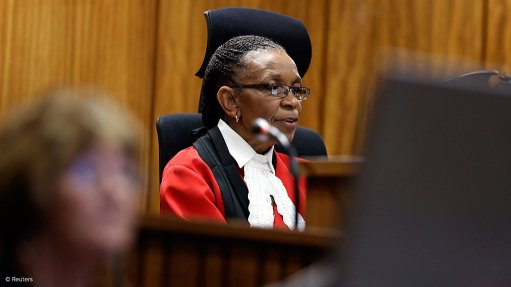
Judge Thokozile Masipa
Photo by: Reuters
The Commission for Gender Equality (CGE) has noted, with concern, the publicised, unwarranted personal attacks on Judge Thokozile Masipa who recently presided over the criminal trial of Oscar Pistorious.
The judicial process wherein a judicial officer is tasked with applying the law to material facts (evidence) resulting in a judgment, is a convoluted and intricate process. The integrity of this legal process is further safeguarded by legal remedy for incorrect judgments or rationale in the form of review and appeal proceedings. The CGE is established to support a fair and democratic state wherein the legal basis supporting judicial decisions can be examined, questioned, criticized and appealed or reviewed. Consequently, the CGE therefore denounces any scathing criticism of Judge Masipa either on the basis of her race or gender. The CGE calls upon South Africans to be intolerant of the conduct referred to.
It is ironic that despite the fact that the trial was finalised in a reasonable time compared to many other cases of a similar nature which may take several years to be concluded, Judge Masipa still found herself at the receiving end of unwarranted personal criticism. It is also ironic that whilst Pistorius was on trial, a similar case that was being heard on appeal in the North Gauteng High Court, i.e. Khubeka vs The State (an appeal). In the Khubeka matter, the accused shot and killed his partner; and after a lengthy legal process, the murder conviction was overturned as a result of lack of evidence from law enforcement agencies. In his ruling the judge said that the police had not been efficient in their work, and that it is ironic that no resources or money was spared in the high profile matter heard in court in the same division.
It is further disconcerting that the Khubeka matter has been in the justice system for over nine years. The contentions in a case such as this one revolve around the slow pace in delivering justice as well as inefficiencies of law enforcement institutions.
Co-incidentally, on the same day that Judge Masipa delivered her judgment, there was a case being decided in Butterworth, wherein a young woman had been stabbed to death by her male partner in December 2013. Through the intervention of the CGE and Sonke Gender Justice, the tardy police investigation and the state’s failure to oppose bail at the court a quo win as addressed. Consequently, the matter proceeded to trial wherein a guilty verdict was obtained. The type of action taken and delivery of justice in this case should be applied countrywide, especially in rural areas where communities have limitations in accessing the justice system.
There are far more critical issues within the judiciary, which need greater attention and redress in relation to gender based cases that appear in court. It is therefore important that citizens rather become more concerned with the balance in the application of justice in high profile cases vis-à-vis, other cases that affect ordinary South Africans.
In conclusion, CGE, as a Chapter 9 institution, respects the institutions set up by our Constitution,( the Executive, the Legislature, and the Judiciary) will not in any way interfere with their functioning, as there are sufficient checks and balances in our Constitutional Framework. CGE will continue to monitor the matter until it reaches its finality, in the interests of ensuring that the gains made in favour of gender equality thus far, are not reversed in any way.
Issued by: Commission for Gender Equality